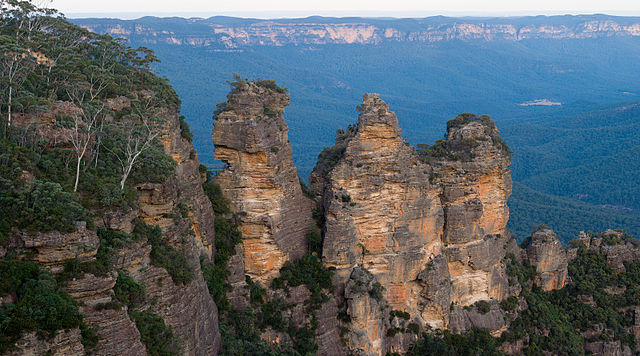A thousand feet down, a flight of cockatoos makes its way across the green canopy, clearly visible through the bright mountain air. Loud calls of unseen birds echo across the forest. The sandstone cliffs are steep and challenging, plunging the walker from time to time into rainforest, where the footing is damp and muddy, only for the trail to then climb almost vertically.
I’m a city boy, born and bred, and I’ve lived in London or New York for the greater part of my life. So why do I find such moments so appealing? Even though I know that they are fake? There’s a learned urban desire for mental renewal by being outside, a middle-class Disneyland.
In the past year, those of us in the Occupy movement have spent a great deal of time outdoors. Radical politics in eighteenth century Britain was known as “out-of-doors.” So if the presumed “public sphere” is in fact largely indoors, in coffee houses, theatres, meeting halls, and the like, its radical supplement is often outdoors. We’ve drawn much energy from being outside in the urban interior–for cities, as Benjamin taught us, are all interior.
For the most part, however, conservation has been, as the name suggests, a conservative movement. It was tied to the sense of nation as the land and a particular kind of embodiment that resulted from having been born on that land. The obvious contradictions in such views, such as the exclusion of indigenous peoples from that nationhood, never troubled conservationist nationalism.
It is perhaps, then, no coincidence that the realignment of the environment as a “left” issue was contemporary with the Civil Rights Movement. In the U. S., the 1964 Wilderness Act, defined the condition poetically rather than quantitatively and to the exclusion of questions of belonging:
A wilderness, in contrast with those areas where man and his own works dominate the landscape, is hereby recognized as an area where the earth and community of life are untrammeled by man, where man himself is a visitor who does not remain.
Is there such a place? The Blue Mountains have been lived in by the Gundungurra, Darug, and Wiradjuri people for over 20,000 years. But when the British arrived in Australia, they declared the entire continent terra nullius, unclaimed or empty land–wilderness.
In 1813, a British surveyor noted coal in the region. Two years later, a group of convicts were compeled to build a road into the area. Actual mining began in the 1870s and continued until the end of the Second World War. The traces of mining are not apparent to the untrained eye but the shale oil formations give shape, I learned, to some of the distinctive topography. It was not until 1967 that the modern Aboriginal peoples gained full citizenship in what has become Australia around them.
Indeed, the walk that I took in the Blue Mountains was made possible by the Herculean construction of steps and paths in the cliffs, beginning with the Federal Pass walk created in 1900 to celebrate Australian Federation. While the Federal Pass is still celebrated, the “White Australia” policy that went along with it has been omitted from the story. Now the presence of the indigenous is well acknowledged and their account of the region’s history is presented to all visitors.
Like so many hilltops in colonized nations, the Blue Mountains were once a retreat for colonial administrators away from the summer heat of their domains. Recast as wilderness for tourism, the mountains still tell useful and important stories. Even the clear water that rushes past and falls so dramatically down waterfalls is, despite appearances, polluted with urban run-off and you are warned not to drink it.
Wilderness was a modernist fiction designed to create set-aside regions of physical space to provide mental contrast for urban workers. The very fact of its palpable “contamination,” its complex and challenging histories and consequent impossibility makes for a different kind of appeal. There’s no reason not to go, enjoy a walk or a climb. It’s just not “wilderness.” It’s outdoor Disneyland.

